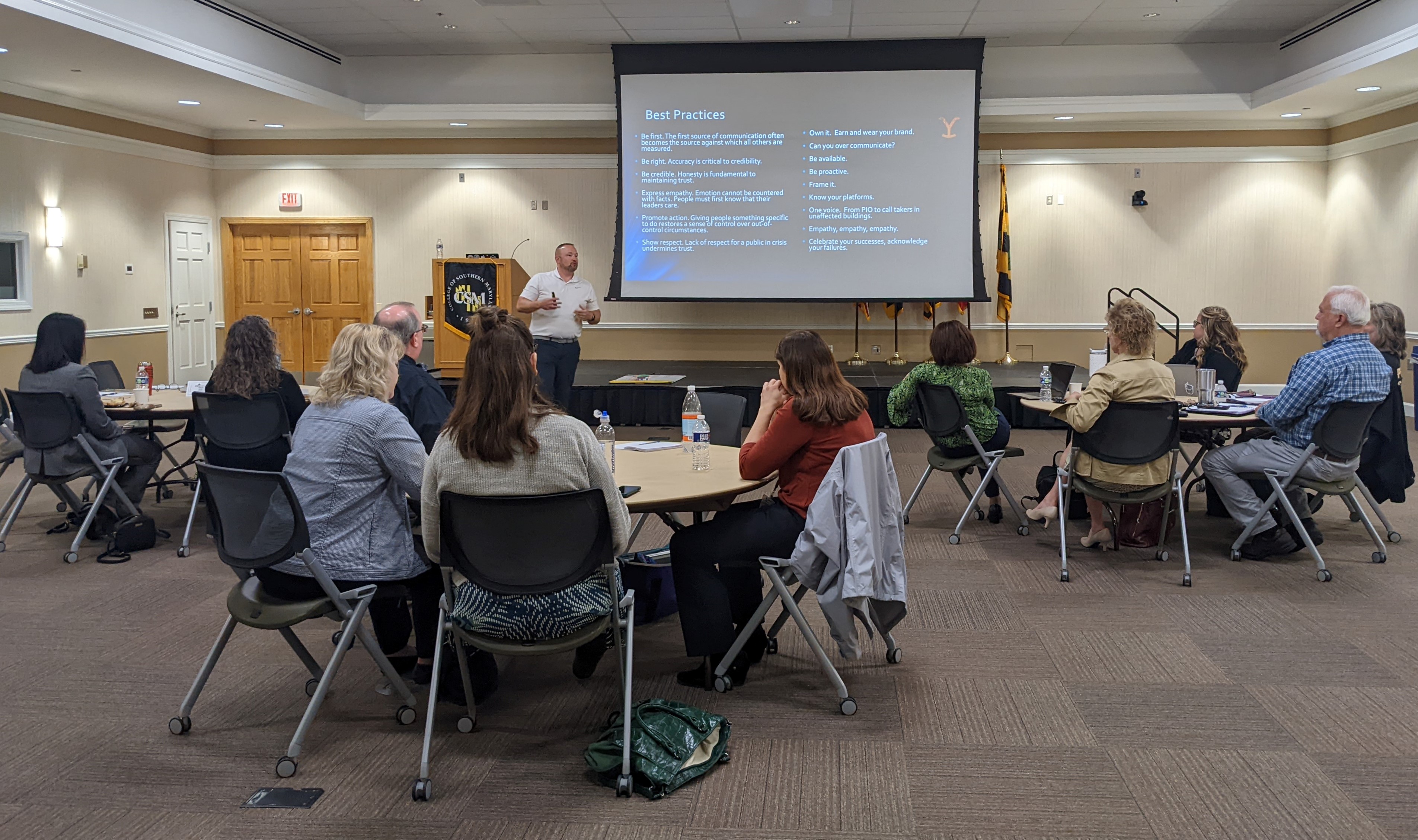CSM Joins, Hosts Regional Institutions to Discuss Crisis Response Plans

CSM Joins, Hosts Regional Institutions to Discuss Crisis Response Plans
What kind of emergencies might impact our region? How would regional institutions work together to address a crisis? How would citizens be kept up to date with vital information during a disaster?
Those questions and more were on the table when representatives from the College of Southern Maryland (CSM), Charles County Government, Charles County Sheriff’s Office, Charles County Public Schools (CCPS), the University of Maryland Charles Regional Medical Center and the St. Mary’s County Government gathered at CSM last month to prepare and coordinate for crises that might impact the region.
“It just takes looking at the news to see why this training and this meeting are needed,” said CSM Vice President of Operations and Planning Dr. Bill Comey in his welcoming remarks. “Being able to immediately spring into action to manage a crisis is so important.”
The training was led by CCPS Director of Safety and Security Jason Stoddard who is a nationally recognized expert on crisis management. In leading the team discussions, he drew upon on his experience as a lieutenant with the Charles County Sheriff’s Office and his education in organizational leadership, criminal justice, and public administration to teach organizations around the country about crisis management.
Stoddard walked attendees, who included public safety personnel and public information officials from participating entities, through best practices for leadership during a crisis, including setting up an Incident Command System and Crisis Communication Plan.
“The whole point of today is to get to know each other better and build our relationships because those foundations are what will make us successful when we are faced with a crisis – whether we’re handling the crisis together or reaching out to support each other’s agencies,” Stoddard said.
Attendees discussed emergencies that have already affected our region, such as the powerful 2002 F4 tornado that devasted La Plata and the COVID pandemic, and what lessons could be learned from both in terms of the way each institution handled the emergent issues.
The group also broke into smaller teams to discuss the strengths that their organizations can, and do draw from when addressing a crisis, and discussed ways they might work together to share resources during an emergency – as each organization uses different methods of reaching their audiences, residents and media. They also have different employee skill sets to offer and a variety of physical resources, such as cameras and drones, that can be made available and shared when needed. Some such agreements, such as CSM’s La Plata campus serving as a reunification site for CCPS in the case of an emergency, are already in place.
The groups also discovered that they face similar challenges and discussed how they might share resources and best practices for addressing them. One example mentioned was the difficulty of battling online misinformation, and CSM and CCPS both shared that it is particularly difficult to respond to social media controversies while also protecting the privacy of students and their education records.
“While the pandemic gave us lots of practice in handling a crisis, it is always essential to be ready for the next thing that comes along,” said Jennifer Harris, chief of media services for Charles County Government. “We are going to be the ones responding to whatever happens on the ground, and we need to practice putting out one message with many voices.”
The safety of the College of Southern Maryland community during an emergency is predicated on advance planning – such as this training, as well as on building awareness about how the plans will be implemented. Students, faculty, staff, and visitors will be better prepared in an emergency if they know how the college will respond, where they can find information, and what they should do. Please visit CSM Ready for CSM’s emergency preparedness information, and much more, at www.csmd.edu/ready/index.html my.CSMD
my.CSMD